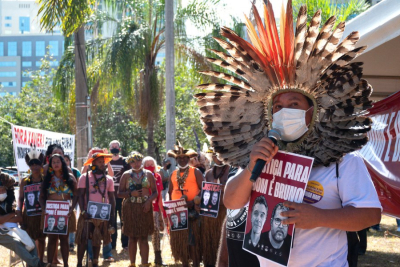Laura Furones of Global Witness said: “As the climate crisis accelerates, those who use their voice to courageously defend our planet are met with violence, intimidation, and murder. Our data shows that the number of killings remains alarmingly high, a situation that is simply unacceptable.”
Most killings were reported for the second consecutive year in Colombia, with record of 79 defenders (compared to 60 in 2022 and 33 in 2021). No other country had ever as many environmental defenders killed in a year. Since 2012, 461 Colombian defenders were killed, more than any other country. The majority of the attacks took place in southwestern regions of the country with drug trafficking, coca production, armed conflicts and organized crime groups being responsible for the deadly violence.
Global Witness has urged Colombian government to focus on the safety of environmental defenders during the Biodiversity COP16, taking place in October 2024 in Cali, western Colombia.
Sad record of Colombia is followed by Brazil, Mexico and Honduras. This makes once again Latin America the deadliest region for environmental defenders with 166 killings last year (112 in South America and 54 in Mexico and Central America).
Brazil has witnessed fewer killings compared to 2022 (from 34 to 25). Under the president Lula da Silva, some progress was made to protect Amazon from exploitation in contrast to destruction of Jair Bolsonaro.
Central America is becoming one of the most dangerous places for environmental defenders. With 18 of defenders killed in 2023, Honduras had most killings of defenders per capita last year, followed by Nicaragua. The report places special focus on Central America and highlights that Central American countries face significant dangers for environmental defenders due to trends such as authoritarianism, corruption, organized crime, militarization, and corporate exploitation in this biodiversity-rich region.
In Asia, most homicides (64 %) occurred in Philippines between 2012-2023. In Africa, most dangerous country is the Democratic Republic Congo. However, figures in Africa are considered to be hugely underestimated due to lack of information.
Global Witness identified mining as the most deadly industry for environmental defenders, attributing 25 killings to this sector. While 23 of these killings happened in Lain America in 2023, historically, 40 % of mining-related deaths of environmental defenders occurred in Asia since 2012. Attacks disproportionately harm indigenous people and communities, and those of African descent. Both groups account for about half of all killings in 2023. Report also highlights specific dangers for women defenders and female relatives of defenders.
Lethal attacks often occur alongside with wider assaults and threats to defenders. These include cases of enforced disappearances and abductions, which are used widely in Philippines and Mexico, in particular. Report also highlights the hidden stories which will never be reported because of threats or lack of information.
Global Witness also highlights the wider use of criminalization as a way to silence activists globally. These trends were also reported by the CRI or the Stop Persecution. In the USA, a police officer shot dead an environmental defender who was demonstrating against the destruction of a local forest.
In conclusion, the report presents a set of recommendations for states and businesses. Key requirements include the enforcement of existing frameworks like the Aarhus Convention in Europe and the Escazú Agreement in Latin America, as well as the establishment of similar frameworks in Asia and Africa where they are lacking. Systematic monitoring and reporting of violence against environmental defenders, along with ensuring access to justice for victims of such violence, are crucial. Businesses must also implement robust due diligence policies to prevent human rights violations. Furthermore, parties to international environmental agreements should ensure that the voices of defenders, particularly Indigenous communities, are central to climate discussions and decision-making.
Specific recommendations for the EU and its members states include proper implementation of the Corporate Sustainability Due Diligence Directive (CSDDD) and Deforestation-free Products Regulation. The EU should also do more to systematically monitor environmental rights abuses.
South African defender Nonhle Mbuthuma, Goldman Environmental Prize Winner 2024, said in a powerful foreword to the report:
“Across every corner of the globe, those who dare to expose the devastating impact of extractive industries—deforestation, pollution, and land grabbing—are met with violence and intimidation. This is especially true for Indigenous Peoples, who are essential in the fight against climate change, yet are disproportionately targeted year after year.
Yet the brutality of these attacks reveals something profound: the power that ordinary people wield when they unite for justice. Leaders have a duty to listen and ensure that land and environmental defenders can speak out, everywhere, without fear of reprisal. This responsibility falls squarely on the shoulders of every wealthy and resource-rich nation worldwide.”
“Every killing leaves the world more vulnerable to the climate, biodiversity and pollution crises,” the report concludes.
Sources:
ENG 10/09/2024 Almost 200 people killed last year trying to defend the environment, report finds (The Guardian)
ENG 10/09/2024 Global Witness Annual Defenders Report 2023/2024: Missing voices (Globalwitness.org)
ENG 10/09/2024 Press release: More than 2,100 land and environmental defenders killed globally between 2012 and 2023 (Globalwitness.org)
ENG 09/2024 On Thin Ice: Disproportionate Responses to Climate Change Protesters in Democratic Countries (CRI.org)
ENG 2024 Repression of climate acticism in Europe (Stop-persecution.org)


